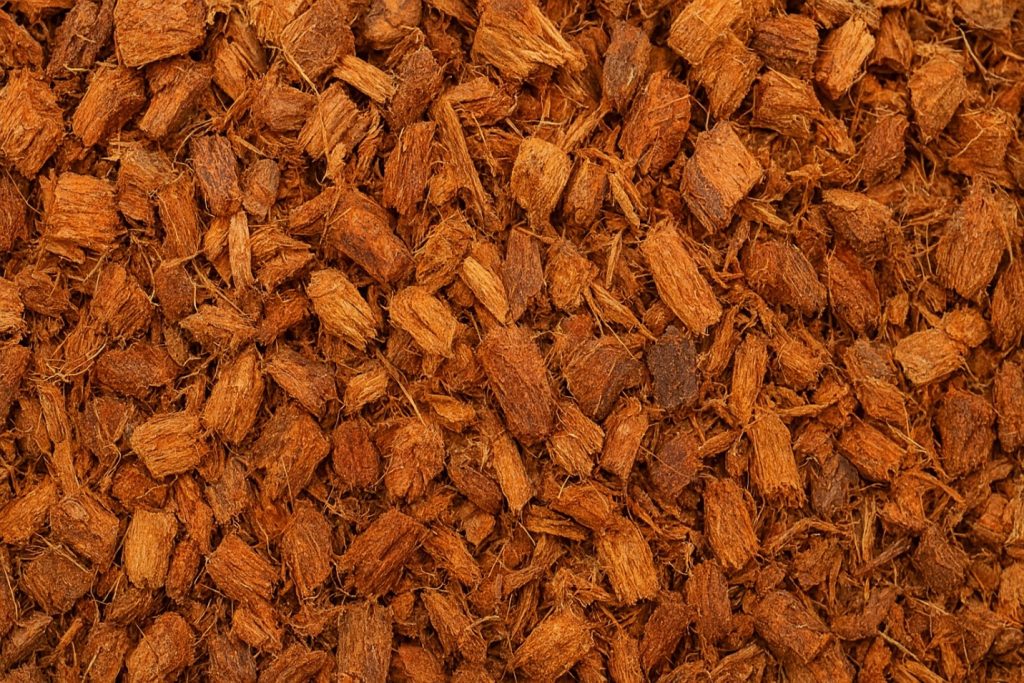Have you ever wondered what to do with the fibrous outer shell of a coconut? This material, known as coco husk or coir, is more than just waste. It’s a fantastic, eco-friendly resource that can help your plants thrive! From houseplants to garden beds, coco husk offers a range of benefits that make it a gardener’s best friend. 🪴
What Exactly is Coco Husk?
Coco husk for plants is the natural fiber extracted from the outer shell of a coconut. After the coconut is harvested, the husk is processed into various forms, each with its own unique use in gardening and beyond.
Different Forms of Coco Husk
- Coco Coir/Peat: This is a fine, peat moss-like substance that is excellent at holding water. It’s perfect for seed starting and potting mixes.
- Coco Fibers: These are the long, stringy fibers that provide excellent aeration when mixed into the soil.
- Coconut Husk Chips: These are chunkier pieces of the husk. Coconut husk chips are a popular choice for plants that need a lot of air around their roots, like orchids and anthuriums. They provide great drainage while still holding some moisture.
Why Your Plants Will Love Coco Husk
Using coco husk in your garden or for your potted plants comes with a host of advantages. It creates a healthier environment for roots to grow strong.
Excellent Water Retention
Coco husk acts like a sponge, absorbing and holding water efficiently. This means you don’t have to water your plants as often, as the roots can draw moisture from the husk when they need it.
Great Aeration and Drainage
While it holds water well, coco husk also has a fibrous, airy structure. This prevents the soil from becoming compacted, allowing oxygen to reach the roots and excess water to drain away. This is crucial for preventing root rot.
Neutral pH Level
Most coco husk products have a pH level that is close to neutral (between 5.5 and 6.8), which is the ideal range for the majority of plants to absorb nutrients effectively.
Eco-Friendly and Sustainable
Coco husk is a completely natural, renewable resource. It’s a by-product of the coconut industry, so using it helps reduce waste. It’s a wonderful, sustainable alternative to peat moss, which is harvested from non-renewable bogs.
Common Applications for Coco Husk
Coco husk is incredibly versatile. Its unique properties make it suitable for a wide range of uses, from growing plants to creating comfortable habitats for pets.
As a Growing Medium
Coco husk, especially in its coir or chip form, is a fantastic standalone growing medium for hydroponics or soilless cultivation. Many growers use it for succulents, orchids, and tropical plants that require a chunky, well-draining mix.
As a Soil Amendment
Mixing coco coir or fibers into your garden soil or potting mix can dramatically improve its quality. It lightens heavy clay soils and helps sandy soils retain more water and nutrients, creating a better structure for healthy root growth.
As Mulching
Spreading a layer of coconut husk chips on top of your garden soil or around the base of your plants acts as a great mulch. It helps the soil retain moisture, keeps weeds from sprouting, and regulates the soil temperature, protecting roots from extreme heat or cold.
As Animal Bedding
Beyond the garden, coco husk is highly valued as animal bedding. It is especially popular as coconut reptile bedding because it is absorbent, controls odor, and is excellent at maintaining the high humidity levels that many reptiles, like snakes and lizards, need to stay healthy. It’s also soft and allows for natural burrowing behavior.
Get in Touch!
Ready to transform your garden with the power of coco husk? Our team is here to help you find the perfect product for your needs.
Contact us for inquiries and orders:
- WhatsApp: (+62) 812 1233 3590 (Ms. Maria)
- Email: [email protected]


